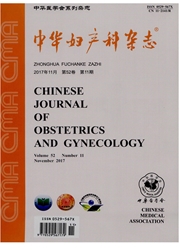

 中文摘要:
中文摘要:
目的研究β-淀粉样蛋白(Amyloid beta A4 protein,APP)mRNA在卵巢肿瘤患者组织中的表达,并探讨其临床意义。方法Trizol一步法提取卵巢肿瘤患者卵巢组织总RNA,实时荧光定量PCR技术对49例卵巢癌、20例卵巢良性肿瘤、16例正常卵巢组织进行定量分析。结果APP mRNA在卵巢癌中表达量比在卵巢良性肿瘤和正常卵巢组织中明显升高(P〈0.05);卵巢颗粒细胞瘤患者组织APP的表达显著高于上皮性卵巢癌(P〈0.05);术前行新辅助化疗的卵巢癌患者APP表达量显著高于良性组和正常对照组,但与非化疗患者的表达没有差异,提示化疗不会降低其表达量。APP表达量与卵巢癌患者的生存率无显著相关性,不是独立判断卵巢恶性肿瘤患者预后的因素。结论卵巢癌患者肿瘤组织APP mRNA水平显著高于良性和正常对照组,并在卵巢颗粒细胞瘤中高表达,提示其增高与恶性肿瘤的组织学类型有关,具有一定的临床诊断意义和价值。
 英文摘要:
英文摘要:
Objective To study the expression of β-amyloid A4 protein ( Amyloid beta A4 protein, APP) mRNA in ovarian tumor tissues and its clinical significance. Methods One-step Trizol extraction method was used to extract the total RNA from 49 cases of ovarian cancer, 20 cases of benign ovarian tumor and 16 cases of normal ovarian tissue. Real-time fluorescence quantitative PCR technology was used to analyze APP mRNA in each sample. Results The expression of APP mRNA in ovarian cancer tissue was significantly higher than those in benign ovarian tumor and normal ovarian tissue ( P 〈 0. 05 ). The expression of APP mRNA in ovarian granulose cell tumor was significantly higher than that in epithelial ovarian cancer ( P 〈 0.05 ). The expression of APP mRNA in ovarian cancer tissue from the patients treated with preoperative neo-adjuvant chemotherapy was significantly higher than that in benign ovarian tumor, but was not different from that in ovarian cancer without neo-adjuvant chemotherapy. The level of APP mRNA and the survival rate of patients with ovarian cancer had no significant correlation. Conclusions The high expression of APP ovarian cancer is related to the histological type of tumor, but the expression of APP is not an independent judgment factor for prognosis of ovarian cancer. Chemotherapy does not reduce the expression of APP mRNA. Detecting APP expression has certain value for diagnosis of the ovarian cancer.
 同期刊论文项目
同期刊论文项目
 同项目期刊论文
同项目期刊论文
 期刊信息
期刊信息
